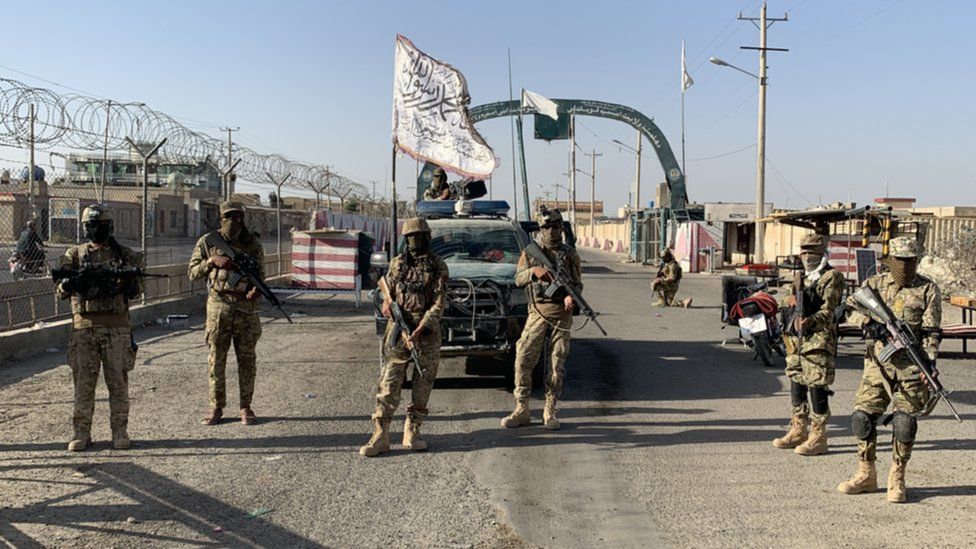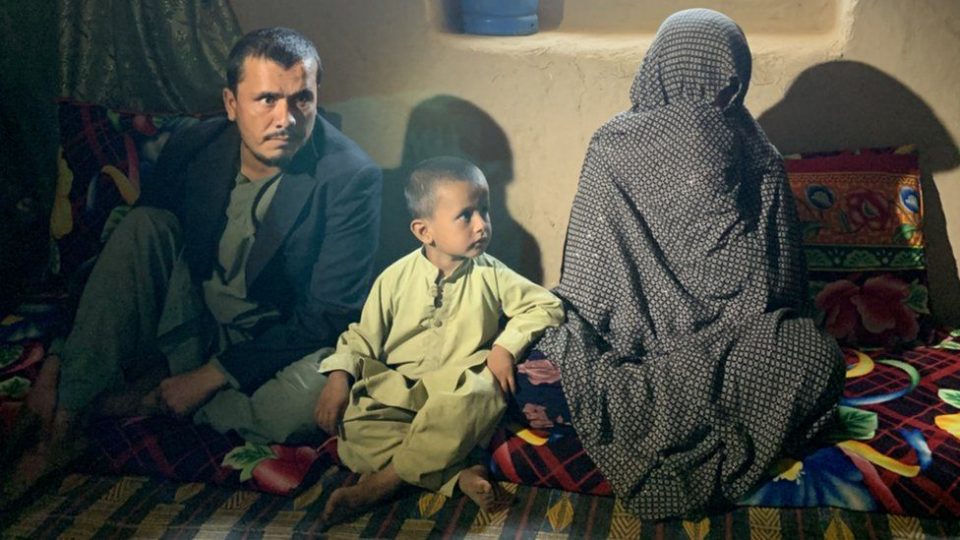The interior of the house made of mud bricks was cool, clean and calm. A man called Shamsullah, who had a small son clinging to his leg, ushered his visitors into the room where they received guests.
A rug covered the floor and cushions ran along the walls that were at least two-feet thick. A few treasures were on display. A small cabinet with half a dozen tiny coloured glass bottles. But the family are poor, and any possessions they had were destroyed or looted during the last 20 years of war.
The house was a refuge from the hot sun and dusty air outside. It was surrounded by high mud walls, like all the family compounds in the fields that became battlefields in Marjah, Helmand province. Inside the walls they were ready to harvest a few more puffballs of cotton to be added to the bale Shamsullah had already taken from the fields outside.
Shamsullah ushered in his mother, Goljuma. He said she was 65. She had wrapped herself in a long shawl that covered her head and body down to her knees, with a small gap so she could peer out.
Sometimes I caught the flash of an eye and the bridge of a nose. Goljuma’s voice was strong as she talked about a life full of sadness and a war that destroyed her life and killed her four eldest sons. Shamsullah, the youngest, was the only one left. He was 24, but his face was 10 years older.
Goljuma’s first son to die, 11 years ago, was Zia Ul Huq. He was a fighter for the Taliban. “My son joined the Taliban because he understood that the Americans wanted to destroy Islam and Afghanistan,” she said.https://buy.tinypass.com/checkout/template/cacheableShow?aid=tYOkq7qlAI&templateId=OTBYI8Q89QWC&templateVariantId=OTV0YFYSXVQWV&offerId=fakeOfferId&experienceId=EXAWX60BX4NU&iframeId=offer_0e763acc7b457c03340a-0&displayMode=inline&widget=template
The other three sons died within a few months in 2014. Quadratallah was killed in an air strike. Two other brothers, Hayatullah and Aminullah, were arrested in a police raid on the family home. Shamsullah said his brothers were forced to sign up for the army, where they were killed. As the only survivor, Shamsullah said God decided he had to take on the responsibilities of the family.
“Have you ever tried to balance five water melons on one hand? That’s how it is for me,” he told me. His duties include ensuring the welfare of the widow of his oldest brother, Zia, the Taliban fighter.
“I miss my brothers,” Shamsullah said. “My eldest brother’s wife married my next brother when he died. When he was killed, my next brother married her. When he was killed my fourth brother married her. I married her when he was killed.”
- PROFILES: Who’s who in the Taliban leadership
- INVESTIGATION: Taliban kill civilians in resistance stronghold
- ANALYSIS: Are the Taliban any different this time around?
In 2010, Marjah was chosen as the first set piece operation of the US troop “surge” ordered by President Barack Obama. The idea was that reinforcements would deliver knockout blows that would change the course of the war decisively in favour of the government in Kabul and the American, British and other allied forces that sustained it.
“As we push the Taliban out, there is nothing but a bright future ahead: good schools, good health clinics, a free-flowing market,” a US military press release that year predicted.
The fields of cotton and opium poppies in Marjah turned into a nightmare for the foreign troops that fought the elusive Taliban insurgents. Three months into the long drawn-out operation the US Commander General Stanley McChrystal called Marjah “a bleeding ulcer”. It was fought over many times in the next ten years.
Goljuma was contemptuous of Western leaders who said they were trying to make Afghanistan a better place for the people. “I don’t know anything about their mission. They destroyed the country,” she said.
She was incredulous when I asked her about the opportunities that women were able to take and now are heartbroken to lose. “So many of our people suffered a lot while they were here. They killed our husbands, our brothers and our sons,” she said. “I like the Taliban because they respect Islam. Women like me are not like women in Kabul.”
She said before the Taliban won the war everyone was scared of them. Now they are relieved it is over.

One question, however, is whether she was speaking freely. The Taliban media office insisted the BBC team travelled with an armed Talib bodyguard and a translator it approved as a condition of our presence in Helmand. If they had not been there, we might have heard more about the fear the Taliban drilled into many Afghans.
But I did not doubt Goljuma’s sincerity when she condemned the destruction inflicted on Helmand’s traditional farming community by the world’s most powerful militaries, and her grief about her four dead sons.
In 2001, shortly after the 9/11 attacks on America the US, the UK and their allies invaded Afghanistan with a clear mission: to destroy Al Qaeda and punish the Taliban for harbouring them.
It is what happened next that is much harder to understand and to justify; an unwinnable war that cut across all that they tried to do to improve the lives of Afghans.
Development, like democracy, cannot come from the barrel of a gun. The West had victories along the way. Indeed, a generation of urban men and women were educated and had their horizons transformed. But those benefits did not reach poor and barely educated people in the countryside like Goljuma’s family.https://emp.bbc.com/emp/SMPj/2.43.9/iframe.htmlmedia captionInside the Kabul prison staffed by inmates released by the Taliban
When the Taliban first seized power in 1996, they used violence to enforce their religious and cultural beliefs. Now, most Afghans are too young to remember the years before 9/11 and the invasion.
In Lashkar Gah, young Talibs reacted to the BBC cameras by taking out their mobile phones, filming us and taking selfies with the foreigners. Mobile data is cheap here; our Taliban escort watched BBC Pashto on his phone. The world is open to them in a way that it wasn’t in the 1990s, when the Taliban banned photography.
Their group’s fighters are no longer boys who grew up with no knowledge of the outside world. So will they force their own fighters, let alone the rest of the population, to give up smartphones, the internet and a world that beckons them on? This time it might be harder to bend and break a country.



